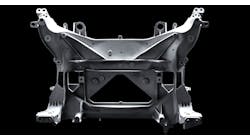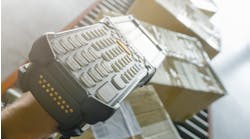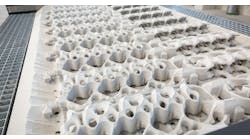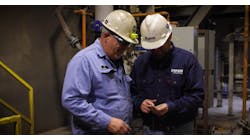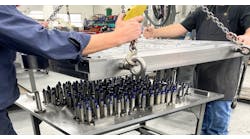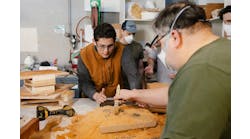A Toronto-based company is perfecting a special metal-matrix composite (MMC) for use as a casting material. Cymat Corp. (www.cymat.com) wants automakers and other OEMs to incorporate its Stabilized Aluminum Foam (SAF) in cast component designs. Cymat has exclusive global manufacturing and sales rights to SAF.
Metalcasters view aluminum porosity as detrimental to castings. But, porosity can be used to advantage in a class of materials known as metal foams. These cellular materials contain a high proportion of regularly sized and spaced voids.
There are two types of metal foams: closed-cell and open-cell. Closed-celled foams, such as SAF, have solid faces so that each cell is sealed off from its neighbor, whereas open-cell foams contain the cell edges only. Using SAF, it is possible to produce a three-dimensional shape that has foam on the inside and an aluminum “skin” on the outer surface. This allows users of the technology to meet the requirement for components with complex geometries and coherent surfaces that can be painted or otherwise treated.
The patented SAF process involves an aluminum alloy with ceramic particles added. The particles stabilize the bubbles formed in the foaming process, insomuch as without the particles the bubbles would form but then immediately collapse.
In production, the molten alloy is poured into a “foaming box.” Gas bubbles exiting from immersed, rotating impellers (a component of the air-injection system) form the foam. Foam collects on the surface, where it can be continuously drawn off and cast into shapes. (Cymat is exploring ways to produce sheet forms, too.)
Cell size is controlled by the gas flow rate, impeller design, and impeller rotational speed. The rate and means by which the gas is introduced can be varied to produce foams with densities from 2.5% to 30% of the density of solid aluminum (i.e. 97.5-70% air). Because many of the mechanical and physical properties of SAF vary with density, having control over the density allows SAF to be tailored to suit the application. SAF’s characteristics include a high strength-to-weight ratio, high-impact energy absorption, thermal and acoustic insulation, and recyclability.
Cymat’s low-pressure casting technique is similar to aluminum low-pressure casting, now widely used to make vehicular wheels. SAF is injected into a mold, while the injection pressure is controlled so that it is sufficient to fill the mold precisely, but not so high as to collapse the cell structure. Cymat has built experimental equipment for process development, manufacturing simple products, and further exploration of the technology.
Another potential application is using SAF for cores for castings. Metalcasters typically use sand cores to make hollow cavities in castings, and to form rib structures where stiffening is required. SAF could augment or replace these methods in castings made from zinc, magnesium, and aluminum — with these benefits:
• SAF would not have to be removed after casting (as a sand core typically is), so holes are not necessary in the casting.
• The SAF core would reduce the weight of the casting by replacing redundant material. Examples of components for this application are connecting rods, pistons, lower control arms, transmission gears, engine block, and brake pistons.
• The SAF core may cost less than the solid aluminum it replaces, depending on the application.
• SAF provides energy-absorbing properties, meaning the part can collapse on impact.
• Complex rib structures could be replaced by one simple part incorporating SAF, leading to simpler die or mold designs and processing methods.
Commercializing SAF
Last September, Cymat entered into an agreement with Italy’s Brembo S.p.A (a global brakemanufacturersystem manufacturer) to evaluate potential uses of aluminum foam as an alternative to traditional sand cores in manufacturing hollow cast components. Said Dr. Paul A. Tichauer, president and CEO of Cymat: “We believe the use of stabilized aluminum foam as a light-weight, permanent casting core can significantly enhance part performance relative to traditional hollow cast components.”
In December 2004, Cymat and Georg Fischer Automotive reached a co-operative agreement to pursue technical, operational, and commercial development of aluminum-foam components for automotive applications in Europe and China. They also anticipate separate licensing agreements for commercial production of aluminum-foam components.
Georg Fischer’s automotive v.p. for R&D, Beat Ruckstuhl, said, “We look forward to co-operating with Cymat in advancing the use of this material in innovative products, where we view Cymat’s technology as ‘production ready,’ and we believe that aluminum foam has a significant opportunity to improve the performance and value proposition of cast components.”
